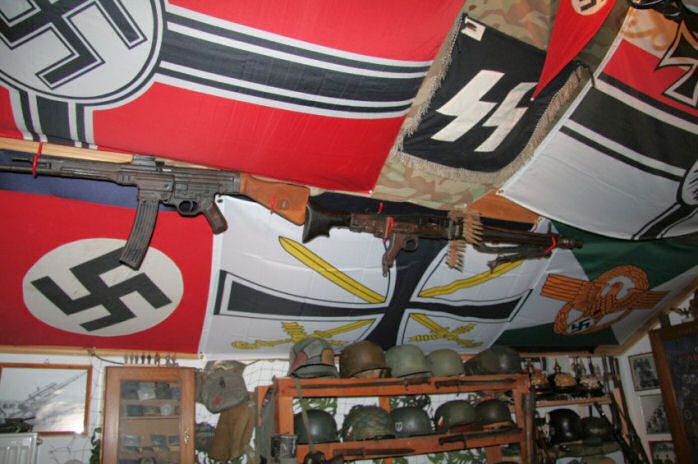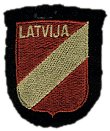Reposted at 02varvara.wordpress.com from www.ruvr.ru, published 16 March 20081
1Glorification of Nazism
 This photo posted with the article appears in Der Spiegel, discussing the rise of German neo-Nazism, and is completely unrelated to Latvians or this article. The original "Voice of Russia" posting is no longer available online.
This photo posted with the article appears in Der Spiegel, discussing the rise of German neo-Nazism, and is completely unrelated to Latvians or this article. The original "Voice of Russia" posting is no longer available online.2Authorities in Riga approved a march by former Waffen-SS legionaries due to be held on Sunday. These marches have become a regular occurrence in Latvia and neighbouring Estonia. 3Meanwhile, organisations opposing the glorification of fascism were denied permission to hold their own rallies today. Earlier, the Latvian Socialist Party published a statement strongly condemning any attempts to revive the Nazi ideology. 4The government, however, seems to completely ignore the fact that the notorious Waffen-SS divisions that operated in countries under German occupation during the Second World War were declared illegal by the Nürnberg Tribunal. 5Incidentally, Hitler’s book Mein Kampf is on sale without hindrance in any bookstore in Riga.
The Parliamentary Assembly of the Council of Europe has repeatedly voiced concern over the idolisation of fascism in a number of European countries. 6In Fieldkirchen in Austria, a local ultra-right group and German neo-Nazis staged a gathering under the slogan “A Jew Was and Remains an Enemy”. In Germany, Udo Voigt, the leader of the extreme right-wing National-Democratic Party, announced recently, “Our time has come”. There are neo-Nazi groups in Hungary and other European countries.
Last autumn, 7Russia presented at the UN General Assembly session a draft resolution aimed to prevent the spread of Nazism and racist movements. It came as a big surprise when 33 countries, some members of the EU included, abstained from voting. A military expert, General Nikolai Leonov, told us how Russia could have acted in such a situation.
“We can discuss the issue in all international organisations, including the European Court in Strasbourg. Fascism can receive other names, but, its essence will always remain the same. All countries condemn this system, that is why we should be persistent to achieve our goals”.
Russian MPs have long been discussing a draft resolution to 8ban neo-Nazi factions from spreading their activity in Europe. Moscow wants the UN Security Council to accept the initiative and make the resolution obligatory for all UN members.
16 March 2008
Voice of Russia World Service
http://www.ruvr.ru/main.php?lng=eng&q=24278&cid=56&p=16.03.2008
Behind the headline
This article is typical of the content manufactured by the Russian state propaganda apparatus, and features all of the Kremlin's formulaic anti-Latvian calumny.
The key contention is that Latvians glorify Nazism. All other accusations flow from this utterly false accusation. It irks the Kremlin that Latvia is not thankful for its so-called "liberation", which was fifty more years of occupations, subjugation, and mass deportations of Latvians.
The event is a commemoration. The Kremlin would have people believe it is some goose-stepping march.
The commemoration remembers those who died fighting against Soviet reoccupation and in hopes of restoring Latvian sovereignty. No "glorification of fascism" is involved. The organizations "opposed to fascism" are actually Russian-operated fronts associated with the Kremlin-run World Without Nazism. Of course, permits would be denied to Kremlin apparatchiks.
The Latvian Legion Waffen-SS were specifically exempted from Hitler's elite Waffen-SS being declared war criminals. Moreover, former Latvian Legionnaires served as Allied guards of the most notorious war criminals at the Nürnberg (Nuremberg) trials.
In actuality, Mein Kampf was on sale at the time without hindrance in Russia, not Latvia. Sale was eventually banned in 2010 amid fears it might promote extremism.2 Russian-language translations continue to be available on the Internet.
Latvia had already banned the sale of the Latvian translation of Mein Kampf in 1995, thirteen years earlier. Mein Kampf has had only one printing in Latvia, but four in Russia. It had already been translated and made available to Soviet Communist Party officials in the 1930's.
Spurious mention of unrelated and genuine neo-Nazi movements allows for guilt by association—a common propaganda practice. This propaganda has garnered positive results for Russia judging by the Latvian Legion commemoration being denounced by Holocaust activists as symbolic of the alarming resurgence of Nazism—thereby being falsely equated to genuine neo-Nazi movements.
Russia brands anything calling for an honest accounting of Soviet and now Russian atrocities against the peoples of central and eastern Europe as "fascism." First and foremost among Russia's targets is to forever quash public commemoration of the Latvian Legion and its honoring of enduring against impossible odds. As noted on our home page, Latvians held out to the end, indeed, a week past, the end of World War II, petitioning Western powers to support restoration of their independence.
Russia has hijacked the cause of anti-Nazism to serve the Kremlin's own agenda. Getting "Europe" to not commemorate anti-Soviet aka "fascist" commemorations sounds noble and moral, but that is not the Kremlin's purpose at all. Its purpose is to rewrite history, that Stalin "liberated", not subjugated 100,000,000 eastern central and Baltic Europeans at the end of World War II, thus to label anyone who was, or is, anti-Soviet or anti-Russian, a fascist.
Behind the headline
www.ruvr.ru is a web site of state-owned ("Federal State Unitary Enterprise") Rossiya Segodnya, the successor of Kremlin media service RIA Novosti.
Thus, it is no surprise that the "article" follows the formulaic Kremlin denouncement of the annual Legion commemoration: glorification of Nazism, government quashing of "anti-Nazists" (actually Kremlin-funded NGOs tasked with disrupting Latvian society), associating Legion commemoration with the unrelated real rise of neo-fascism, including in Russia, and so on. Russia's motions at the United Nations and elsewhere to prevent the spread of neo-Nazism are cynical and hypocritical attempts to permanently quash the honoring of anyone who fought against Soviet domination.
| 1 | Article published at 02varvara.wordpress.com/ |
| 2 | Russian editions were published in: USSR limited edition for party workers in the early 1930's, 1992, 1998, 2002, and 2003 (ISBN 966-7921-35-1). |
